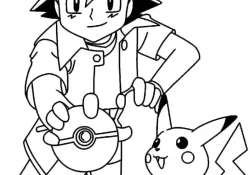"Sate Sate Sate" is one of the famous expressions mentioned by Melodias in Nanatsu no Taizai. What would be the real meaning of the expression sate [さて] in the Japanese language?
We also recommend reading:
- Yamete kudasai, Yamero, Dame and Yada – Meaning
- Dattebayo - The true meaning of Naruto's speech
- The True Meaning of Tatakae and Tatakai
Índice de Conteúdo
Sate translates to "then" in English.
Sate [偖, 扨, 扠] is a conjunction or interjection (kandoushi) that conveys the idea of good, now and then. Usually used at the beginning of a sentence, before talking about a certain subject.
Sate can often be used before the sentence to focus on the subject at hand, without necessarily having a meaningful translation in the text.
If the conversation gets out of focus, or if we need to change the topic of the subject, or if it is necessary to highlight information, we can use “Sate”.
In short, it is a conjunction to indicate a change of topic or a transition in a conversation. It is usually written in hiragana as a particle, without the use of kanji.
What does Sate Sate Sate mean?
The repetition "Sate Sate Sate" and its translation greatly resembles the English expression "Well, Well, Well" used when something surprising is discovered, caught someone in the act or does something before others imagine.
Not common in Japanese, more common would be the double repetition (さてさて) used to express feelings of surprise or being impressed by something.
It might indicate something like No, not at all. My God. Repetition is often used to increase the power and emphasis of the word, in Japanese it is called Jougo [畳語].

Sate Alternatives and Variations
Below we will list some related words derived from or dependent on sate, their meaning as well as some alternatives.
- さては – and also, moreover, then, in that case, if so;
- さて置く - Leave aside;
- 扨も - My, dear me, wow, in fact, truly;
- さてこそ - Just as I thought; as expected;
The article is still halfway through, but we recommend also reading:
Expressions that use さて
Here are some examples of phrases that use "さて":
さて、それでは新しい話題に移りましょう。 Sate, soredewa atarashī wadai ni utsurimashou.
Well, now let's switch to a new topic.
さて、あの件について考えたことはありますか? Sate, ano kudan ni tsuite kangaeta koto wa arimasu ka?
Well, have you thought about that matter?
さて、今度の週末は何か予定がありますか? Sate, kondo no shūmatsu wa nani ka yotei ga arimasu ka?
Well, do you have any plans for next weekend?
さてさて、今度の週末はどこに行こうかな Sate sate, kondo no shūmatsu wa doko ni ikou ka na
Well, well, where should we go this weekend?
さてさて、話が変わって、あなたは最近どうしてるの? Sate sate,-banashi ga kawatte, anata wa saikin dōshiteru no?
Well, well, changing the subject, how have you been lately?
さてさて、その話はもう十分だ。次の話題に移りましょう。 Sate sate, sono-wa wa mō jūbunda. Tsugi no wadai ni utsurimashou.
Well, well, we've said enough about that. Let's move on to the next topic.







